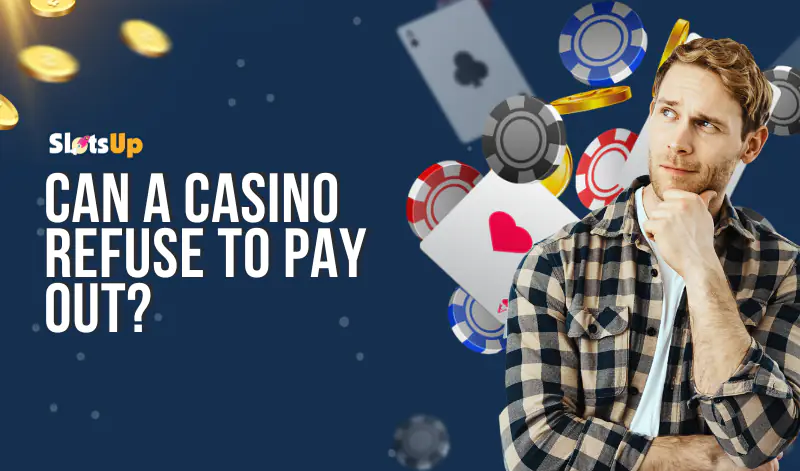
Can a Casino Refuse to Pay Out?
Entering a casino with the hope of hitting the jackpot is an exhilarating experience for many, but what happens when the excitement turns into frustration, and a casino refuses to pay out winnings? This article explores the various reasons why a casino might choose to withhold payouts, exploring legal requirements, gaming programs, and potential pitfalls that players may encounter.
The purpose of this article is to shed light on queries like how much will a casino payout in cash and explore factors that can lead to a casino refusing to pay out winnings. By understanding the underlying reasons, individuals can take proactive measures to safeguard their winnings and enjoy a smoother gaming experience.
It’s important to understand casino payouts by state and the several factors that contribute to payout refusals. The factors include the necessity of valid identification, the implications of the Gambling Intercept Program, the consequences of being on the Self-Exclusion List, and the risks associated with others claiming your winnings.
Some of the popular reasons why casino can refuse to pay you winnings:
- Violation of Terms and Conditions: If a player breaches the casino’s terms and conditions, the casino may refuse to pay out winnings. This can include actions like using prohibited strategies or exploiting loopholes.
- Identity Verification Issues: Casinos require players to verify their identity to prevent fraud. If a player fails to provide accurate and valid identification, the casino may withhold winnings.
- Underage Gambling: If a player is found to be underage, which is a violation of the law and the casino’s policies, the casino will not pay out any winnings.
- Bonus Abuse: Some players engage in bonus abuse, such as creating multiple accounts to claim bonuses fraudulently. Casinos may refuse payment if they suspect such activities.
- Chargeback or Disputed Transactions: If a player initiates a chargeback or disputes transactions related to their winnings, the casino may withhold payment until the issue is resolved.
- Collusion: In multiplayer games, collusion between players to gain an unfair advantage is strictly prohibited. Casinos may refuse payouts if collusion is suspected.
- Cheating or Fraudulent Activities: Any form of cheating, including the use of cheating devices, is grounds for the casino to deny winnings.
- Unusual Betting Patterns: If a player is detected using unusual or suspicious betting patterns, the casino may investigate for potential fraud or advantage play.
- Withdrawal Limitations: Some casinos impose withdrawal limits, and if a player exceeds these limits, the casino may refuse to pay the excess amount until it aligns with their policies.
- Incomplete Wagering Requirements: If a player claims a bonus but fails to meet the associated wagering requirements before attempting a withdrawal, the casino may deny the payout.
Valid Identification
Wondering, ‘Can a casino refuse to pay out in the context of valid identification?’ The case from the late 1980s at Caesar’s in Las Vegas is a clear example of what happens when age regulations are ignored, even if the jackpot is legit. Federal law says you need a valid ID for slot jackpots over $1200 and table game payouts over $10,000. Casinos follow state laws and are serious about stopping people without the right ID from getting onto the gaming floor. This case shows why it’s crucial to follow these rules, no matter if you’ve been to the casino before.
If you forget or your ID is expired, there are immediate consequences. Casinos have to follow the rules and can’t pay you until you show the right ID. This shows how serious they are about following the law, making sure that even if you win, you’ve got to stick to the age verification rules. The casino industry is all about keeping things fair and following the laws that control gambling activities.
The situation at Caesar’s in Las Vegas shows how important it is for casinos to check ages properly. A 19 year old won fortunes but had to go back without receiving a single penny. To follow the law, casinos work hard to stop people without the right ID from getting into the gaming area. This isn’t just about rules, it’s a way to make sure everyone stays safe and gambling is done responsibly.
Casinos are serious about making sure everyone follows federal and state laws, creating a secure and responsible place to play. By being strict about checking IDs, the casino industry shows its commitment to keeping the gaming experience honest and promoting responsible gambling for everyone who comes in.
Gambling Intercept Program
The Gambling Intercept Program is a team effort involving the Federal, Tribal, and State groups. It’s been successful in over a dozen states and many tribal casinos. This program sits at the crossroads of making sure child support rules are followed and regulating gambling. This stops people from getting their winnings if they owe taxes. It gets into the scene when someone wins $1200 or more, using databases that need updates to stay accurate.
It is not the casino’s fault if it takes someone’s money in error. The state or tribe needs to fix it. Nevada is an exception. As of 2023, they’re not on this program. Casinos there worry about making a safe database and want to see it’s secure before dealing with extra rules.
This issue shows how it’s tricky to make sure people pay child support while also making sure programs like this are safe and work well. It tells us we need teamwork, clear communication, and proof that the technology is secure to deal with issues and get more people on board.
Self-Exclusion List
The Self-Exclusion List is a way for people dealing with gambling problems to get help from the state. It lets individuals choose to stop themselves from going to casinos for a certain time or forever. This initiative knows that people with gambling issues need support to take control of their actions.
Being on the Self-Exclusion List is serious business. If someone breaks the ban, they could get in trouble with the law like trespassing charges, possible arrest, and even losing any money they won during the ban. These strict consequences show that the state is serious about keeping people safe from the bad effects of uncontrolled gambling habits.
Big casino chains might go even further by applying the ban to all their properties. This implies that a person who is on the list is unable to wager at any other casino. Once on the Self-Exclusion List, a person will have to consult the casino before they can resume their gaming activities. Casinos keep a record of exclusions on the player’s account, making sure they don’t pay out and sticking to rules for responsible gaming.
So, the Self-Exclusion List is a crucial part of responsible gambling. It gives individuals a way to tackle their addiction and reminds them about the rules they need to follow. This shows how both the state and the gaming industry care about the well-being of people facing gambling problems.
The Dreaded Machine Malfunction
Sometimes, slot machines, even with all their modern technology, mess up and show fake big jackpots or credits, like a crazy $42,949,672.96, because of code glitches. This happens when a specific line of code makes the machine think someone won a ton of money when they didn’t. If your machine says you won millions without the right symbols or a proper jackpot, the casino might not pay you, saying the machine messed up.
This problem is more common in older slot machines with computer-controlled reels. These machines can have wear and tear or mechanical issues that cause glitches. Courts usually say that if there’s a glitch, all bets are off and the casino doesn’t have to pay. Even if the slot machine messes up and says you won a bunch, legal decisions often call it a “gratuitous promise,” meaning the casino doesn’t have to follow through on the mistake.
This legal stance shows why it’s crucial for players to know the risks of machine glitches and that they might not get their winnings if something goes wrong. As technology gets better, the gaming industry needs to work hard to fix these display errors and make sure everyone has a fair and clear gaming experience.
Can Somebody Else Claim Your Winnings?
Seeking an answer to the question, ‘Can someone else claim my casino winnings?’ Instances of individuals attempting to claim another person’s winnings through fraudulent means or theft raise concerns.
Trying to get someone else to claim your jackpot is a serious crime in many states. When it comes to big jackpots over $1200, the casinos use strict checks, including surveillance, to make sure this doesn’t happen. There are serious repercussions for trying to trick the system, including potential legal issues. This demonstrates how hard it is to attempt to con the system in order to obtain money that isn’t legally yours.
Conclusion
Understanding why a casino might deny winnings is crucial for gamblers. Legal regulations, gaming programs, and potential criminal activities can impact a player’s ability to receive their earnings. To enhance their gaming experience, players should follow legal guidelines, stay informed about relevant programs, and avoid actions that could impact their winnings.
Following the laws, staying updated on programs, and steering clear of potential obstacles ensures a smoother gaming journey. By doing this, gamers may confidently participate in casino games and have fun while having a thorough understanding of the gaming industry. To get the most out of your casino experience, play sensibly and always follow the regulations.
Some interesting article about casinos refusing to pay:






